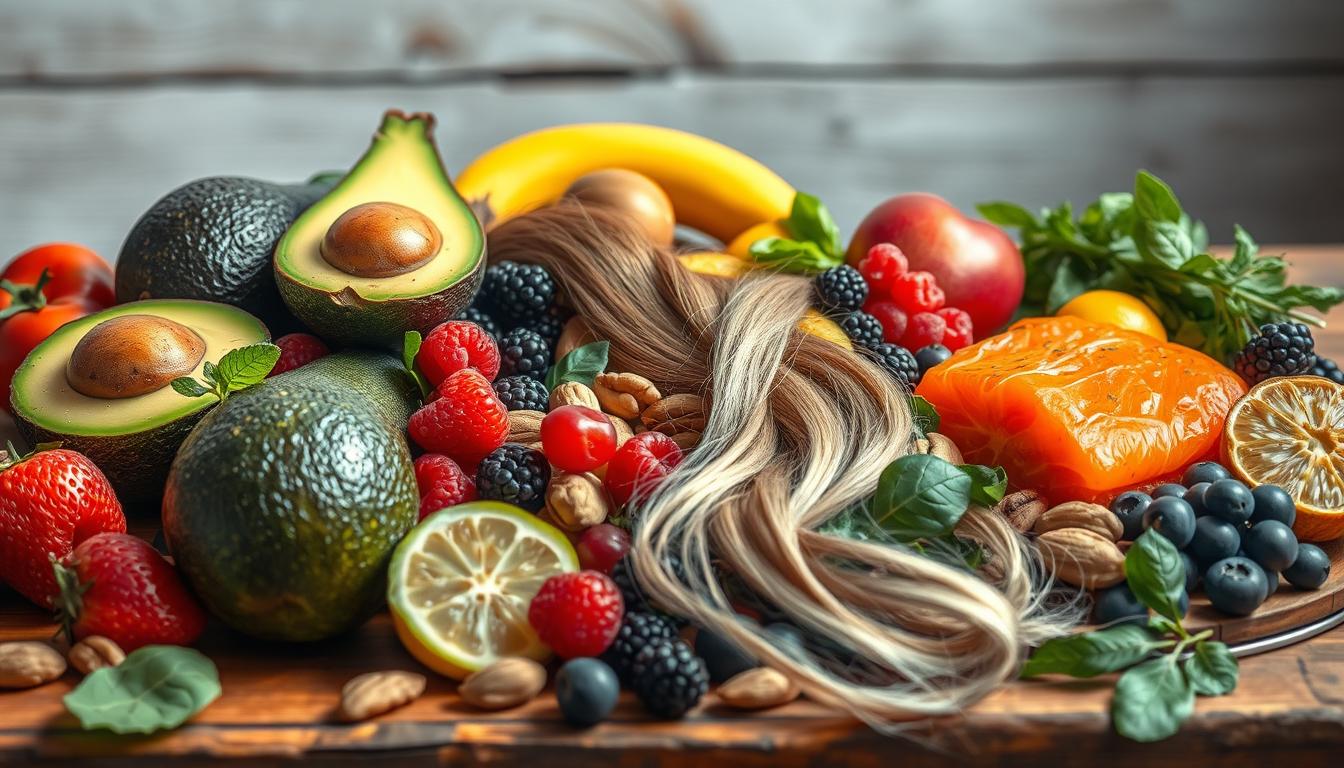A 2016 study found that 38% of women with hair loss lacked biotin. This shows how important vitamins and diet are for hair growth. The right mix of vitamins and nutrients can help your hair grow strong and healthy.
Knowing about vitamins and diet for hair growth helps you choose better haircare. Vitamins for hair offer many benefits. Adding them to your diet can make your hair healthier and stronger. By focusing on vitamins and diet, you can get on the path to having vibrant hair.
Key Takeaways
- Vitamins and diet are key for hair growth, with the wrong nutrients causing hair loss.
- Biotin, iron, and other nutrients are vital for hair health and can be found in food or supplements.
- Eating a balanced diet with lots of nutrient-rich foods supports hair health and growth.
- Drinking enough water is crucial for hair growth, with women needing about 2.7 liters and men 3.7 liters daily.
- Stress can make hair problems worse, so managing stress is important for hair health.
- Hair growth is slow, with noticeable improvements taking a few months.
- Adding haircare vitamins and nutrients to your diet can help your hair grow strong and healthy.
Introduction
Nutrition is key for hair growth. Knowing why it matters helps keep hair healthy. A balanced diet gives hair the nutrients it needs. Without these, hair loss can happen.
Eating vegetables, lean proteins, and supplements helps hair grow. Yet, many don’t get enough nutrients. This can harm hair health.
Important nutrients for hair include vitamin D, vitamin E, and iron. Not having enough can cause hair loss and dryness. But, eating foods rich in these can help hair grow and stay healthy.
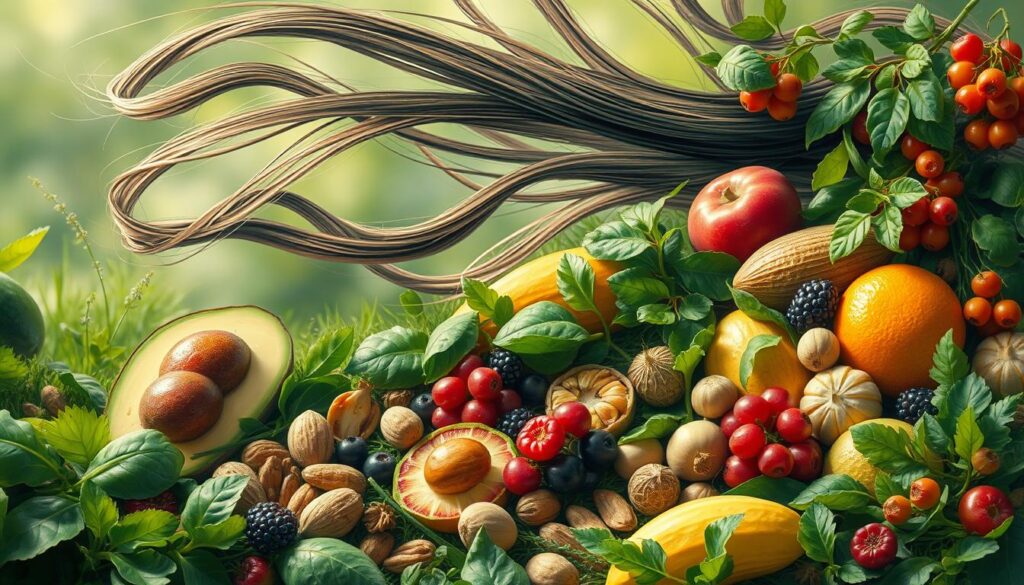
Here are some key statistics that highlight the importance of nutrition for hair growth:
- 40% of American adults are vitamin D deficient, which can disturb the hair follicle renewal process and result in hair loss.
- By age 50, approximately 85% of men will experience hair loss, according to the American Hair Loss Association.
- Women represent 40% of American hair loss sufferers, indicating a significant demographic affected by hair thinning.
In conclusion, nutrition is vital for hair growth. A balanced diet with essential nutrients is crucial. Understanding this helps ensure healthy hair.
| Nutrient | Importance for Hair Growth |
|---|---|
| Vitamin D | Essential for hair follicle renewal and growth |
| Vitamin E | Helps promote hair growth and maintain healthy hair |
| Iron | Essential for hair growth and maintenance |
Vitamin 1: Biotin (Vitamin B7)
Biotin, also known as vitamin B7, is key for healthy hair growth. It strengthens hair follicles and promotes growth. Without enough biotin, hair can become thin, so it’s important to eat biotin-rich foods or take supplements.
Beef liver, eggs, and nuts are great sources of biotin. But, eating raw eggs can block biotin absorption because of avidin. Adults need 30 micrograms of biotin daily, and lactating women need 35 micrograms.
The following table lists some common foods rich in biotin:
| Food | Biotin Content (mcg) |
|---|---|
| 3 ounces of cooked liver | 30.8 |
| 1 large whole cooked egg | 10 |
| 1 cup of roasted sunflower seeds | 9.6 |
| 1 cup of roasted almonds | 6 |
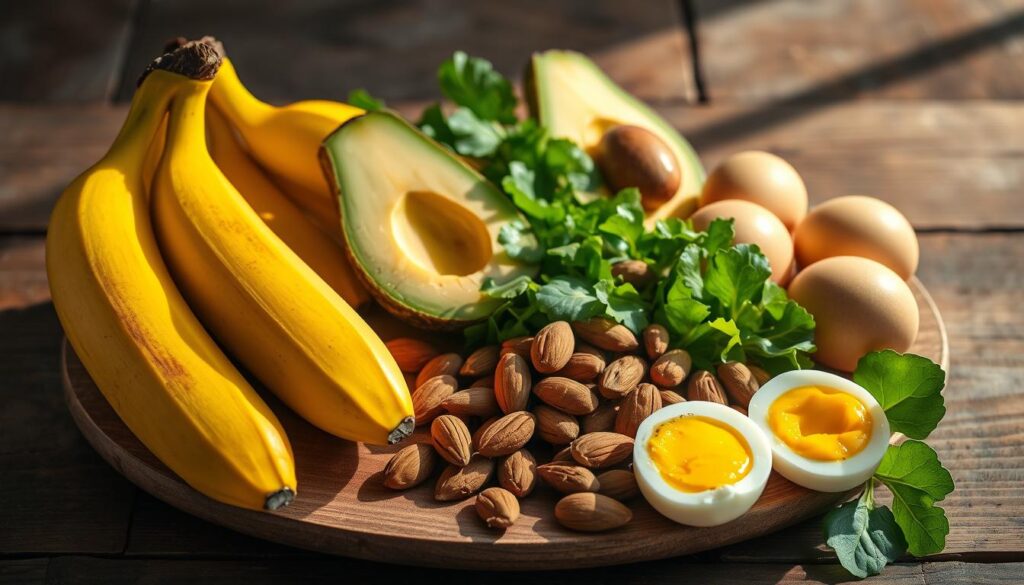
Vitamin 2: Vitamin D
Vitamin D is key for our health, and it helps with hair growth too. Not having enough vitamin D can cause hair loss. It also keeps our skin and bones healthy.
Fatty fish like salmon and mackerel are good sources of vitamin D. So are fortified dairy products and cereals. Always talk to a doctor before taking supplements. Adults need 600 IU or 15 mcg of vitamin D daily.
A study linked low vitamin D to hair loss. Another study found people with alopecia areata had less vitamin D. These studies show vitamin D is crucial for hair and health.
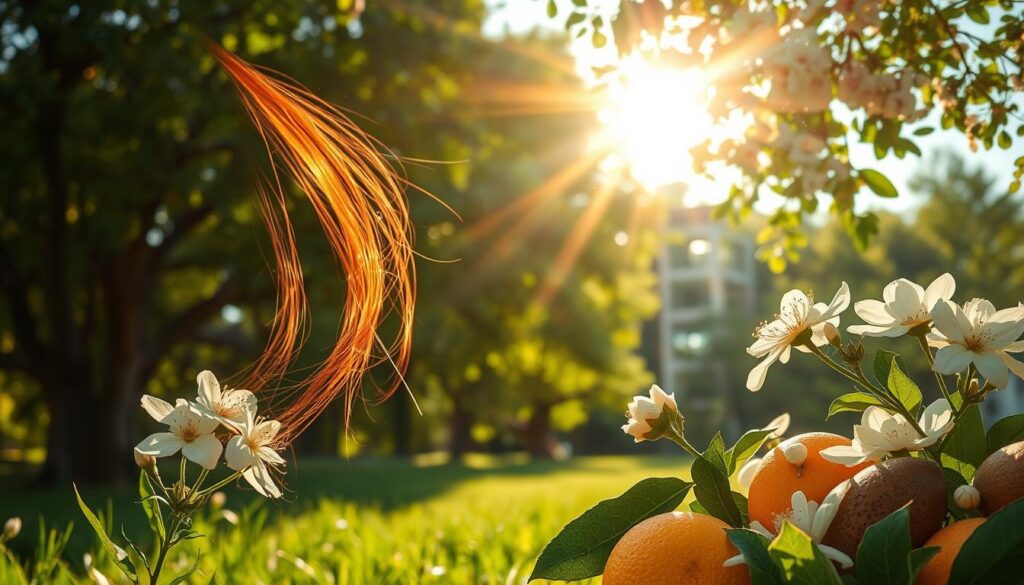
| Food | Vitamin D Content (per serving) |
|---|---|
| Salmon (3 oz) | 600 IU |
| Mackerel (3 oz) | 360 IU |
| Fortified milk (1 cup) | 100 IU |
In short, vitamin D is vital for hair growth and health. Eating foods rich in vitamin D or taking supplements can help. This can prevent hair loss and promote growth.
Vitamin 3: Vitamin E
Vitamin E is key for healthy hair growth. It protects hair follicles and boosts growth. Studies show it’s good for both hair and scalp health.
Some foods high in vitamin E are nuts, leafy greens, and vegetable oils. Here are some examples:
- 1 tablespoon of wheat germ oil contains 20.3 milligrams (mg) of vitamin E
- 1 ounce of dry roasted sunflower seeds provides 7.4 mg of vitamin E
- 1 ounce of dry roasted almonds contains 6.8 mg of vitamin E
Too much vitamin E can harm your health. The National Institutes of Health say to not take more than 1,500 IU of natural vitamin E or 1,100 IU of synthetic per day. Most people get enough from their diet, so deficiency is rare.
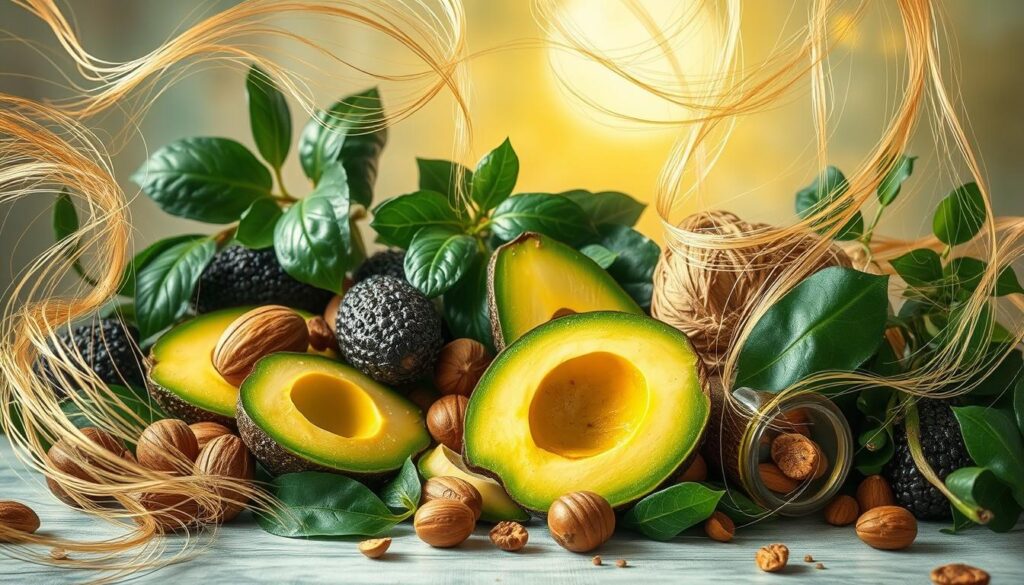
| Food | Vitamin E Content (mg) |
|---|---|
| Wheat germ oil (1 tablespoon) | 20.3 |
| Sunflower seeds (1 ounce) | 7.4 |
| Almonds (1 ounce) | 6.8 |
Vitamin 4: Vitamin A
Vitamin A is key for hair growth. Not having enough can cause hair loss. Eating foods high in vitamin A helps hair grow. It’s important to eat a balanced diet with lots of vitamin A.
The daily amount of vitamin A needed is 700 micrograms for women and 900 micrograms for men. Not getting enough can cause hair problems. But too much can also harm hair and glands.
Some foods rich in vitamin A include:
- Sweet potatoes
- Carrots
- Dark leafy greens
- Fatty fish
- Egg yolks
Eating these foods helps hair grow and prevents loss. You might also want to talk to a doctor about supplements.
Vitamin A helps hair by changing how skin cells work. It’s important to get just the right amount. Too little or too much can harm hair.
| Foods | Vitamin A Content |
|---|---|
| Sweet potatoes | 20,000 IU per 100g |
| Carrots | 10,000 IU per 100g |
| Dark leafy greens | 5,000 IU per 100g |
Eating foods with vitamin A helps hair grow and prevents loss. Always check with a doctor if you have vitamin A problems.
Vitamin 5: Vitamin C
Vitamin C is key for healthy hair. It protects hair follicles and helps hair grow well. Studies show it fights free radicals, which slow down hair growth and cause loss.
Foods high in vitamin C are easy to add to your meals. Here are some examples:
- Citrus fruits like oranges and grapefruits
- Strawberries, with about 85 milligrams of vitamin C per cup
- Sweet peppers, offering up to 456% of daily vitamin C needs for women and 380% for men
- Broccoli, cauliflower, and Brussels sprouts, all packed with vitamin C
It’s important to get enough vitamin C. Not getting enough can cause hair loss, tiredness, and swollen gums. Since many people don’t get enough, it’s key to watch your intake.
| Food | Vitamin C Content |
|---|---|
| 1 cup strawberries | 85 milligrams |
| 1 medium sweet pepper | 125 milligrams |
| 1 cup broccoli | 100 milligrams |
Eating foods rich in vitamin C helps your hair grow strong. It also lowers the chance of hair loss from vitamin C lack.
Essential Minerals for Hair Growth
Essential minerals are key for hair growth. Not having enough can cause hair loss. So, it’s important to eat foods rich in these minerals. Iron, zinc, and selenium are known as hair minerals or haircare minerals.
These minerals keep hair healthy. Iron helps carry oxygen to hair follicles, aiding growth. Zinc keeps the scalp healthy, which helps prevent hair loss.
Iron for Hair Growth
Iron deficiency is common, more so in vegans and vegetarians. They need 8 mg of iron daily. A lack of iron can cause hair loss.
Zinc for Scalp Health
Zinc is also crucial, with 17% of people worldwide lacking it. Men need 11 mg, women 8 mg daily. Zinc helps keep the scalp healthy and prevents hair loss.
Selenium for Hair Strength
Selenium protects hair from damage. It’s important to eat foods with selenium for strong hair. Even though the daily amount is small, it’s still vital.
To get enough of these minerals, eat foods high in iron, zinc, and selenium. You can also take supplements. But, talk to a doctor before starting any new supplements.
| Mineral | Recommended Daily Intake | Food Sources |
|---|---|---|
| Iron | 8 mg (men), 18 mg (women) | Red meat, spinach, beans |
| Zinc | 11 mg (men), 8 mg (women) | Oysters, beef, chicken |
| Selenium | 55 mcg | Brazil nuts, fish, turkey |
Foods to Avoid for Healthy Hair
Keeping your hair healthy isn’t just about what you eat. It’s also about what you avoid. Some foods can harm hair growth. It’s key to cut down on these foods to keep your hair healthy.
Sugary and processed foods are bad for hair. They can cause hair loss and other health issues. High-mercury fish like shark and swordfish are also harmful. Mercury can damage hair follicles, leading to hair loss.
To have healthy hair, eat a balanced diet. Avoid sugary and processed foods, and high-mercury fish. Here are some tips to help:
- Eat a balanced diet rich in fruits, vegetables, whole grains, and lean proteins
- Limit your intake of sugary and processed foods
- Choose low-mercury fish options
- Stay hydrated by drinking plenty of water
| Foods to Avoid | Reasons to Avoid |
|---|---|
| Sugary and processed foods | Can lead to hair loss and other health problems |
| High-mercury fish | Can cause damage to hair follicles and lead to hair loss |
Tips for a Hair-Healthy Diet
To help your hair grow and prevent loss, eating right is key. This means meal planning for hair growth and adding important nutrients to your meals. A good diet gives your hair the protein, iron, and vitamins it needs to grow.
Choosing the right supplements for hair growth is also important. Supplements like biotin and vitamin D can boost hair growth and make hair follicles stronger. But, always talk to a doctor before starting any supplements.
Meal Planning for Hair Growth
A healthy diet for your hair should include lots of different foods. Here are some tips for a hair-healthy diet:
- Eat foods high in protein, like lean meats, fish, and eggs
- Add iron-rich foods, such as leafy greens and legumes
- Include foods full of omega-3 fatty acids, like salmon and flaxseeds
Supplements for Hair Growth
Along with a healthy diet, supplements for hair growth can also help. Some popular ones are:
- Biotin: strengthens hair follicles and encourages growth
- Vitamin D: crucial for hair growth and upkeep
- Omega-3 fatty acids: feed hair shafts and support growth
Conclusion
Keeping a balanced diet is key for healthy hair growth. Include vitamins and minerals like biotin, vitamin D, and vitamin E in your meals. These help your hair grow and fight hair loss.
While supplements help, eating whole foods is best. Focus on fruits, veggies, lean proteins, and healthy fats. This way, your hair follicles get the nutrients they need.
Good nutrition and lifestyle choices can make your hair look great. Start a diet that’s good for your hair. Your hair’s health is up to you.

